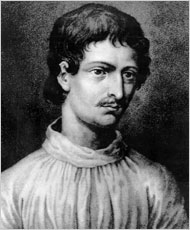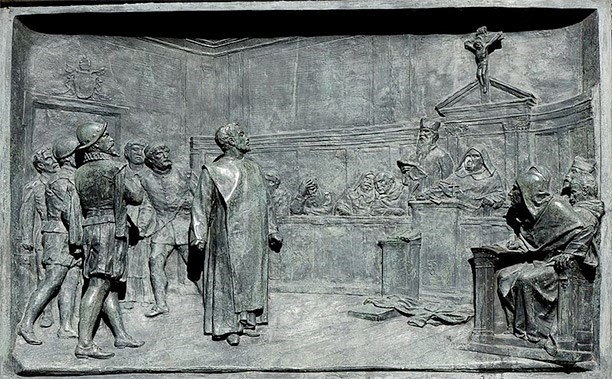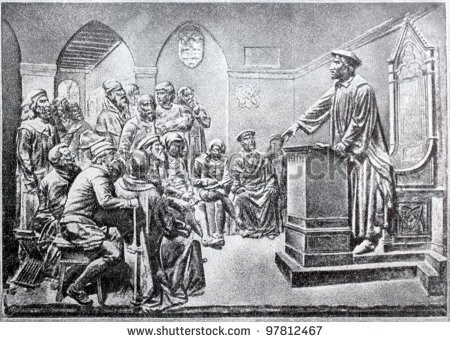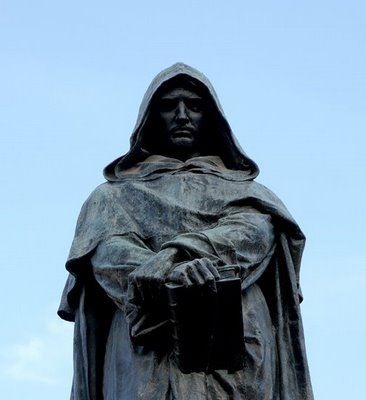 |
| Giordano Bruno ( http://www.nytimes.com/2008/12/21/books/review/Got ()) |
The heretic suffers from the hands of persecution. He must flee day and night to hide from those that would harm him. The pagan struggles to make his voice heard for "the heresy of one age becomes the orthodoxy of the next" (Helen Keller). Giordano Bruno, heretic of the sixteenth century, struggled against the life he always knew but, today, his beliefs make up the basis of modern science and philosophy. Born in Nola, Italy, 1548, Bruno began his studies in the Dominican Church Order from 1565 to 1576. During this period, Bruno studied the philosophy, theology, and science of the church, but he never satisfied his thirst for knowledge. Instead of continuously researching the religion of the church, Bruno studied the forbidden texts of Erasmus and Arianism. Eventually, the church caught Bruno, and Bruno fled from the Dominican Order. After his excommunication, Bruno began his travel across Europe teaching his philosophy. From 1576 to 1592, Bruno wandered while preaching his ideas and publishing books that expressed his heretical views. However, in 1593, Giovanni Mocenigo denounced Bruno to the Venetian Inquisition, and, after a seven-year trial, Bruno burned at the stake. Although many people opposed Bruno's heresy, Bruno surpassed every obstacle with his courage. Throughout his quest, Bruno kept an open mind and continuously built on his philosophy. Because of Bruno's willingness to accept heretical views, many people tried to reject Bruno and prove him wrong. However, Bruno persevered through every piece of criticism and did not let them hinder his preaching. Throughout his valiant life as a philosopher and heretic, Giordano Bruno proved himself to be a hero because of his courage in the face of danger, his open mind that established his philosophy, and his perseverance through criticism and rejection.
 |
| Bruno is tried for heresy. (http://www.historytoday.com/richard-cavendish/gior ()) |
Despite the persecution Bruno would face for heresy, his courage allowed him to spread his philosophy while dismissing the thought of danger. In his time with the Dominican Order, Bruno began to study and defend forbidden texts and ideas. "When the Dominicans learned that Bruno was suspected of defending Arianism, charges were prepared against him. Learning of this, he fled the monastery in 1576. He was twenty-eight, and he would spend the rest of his life in exile or in prison" (Witkoski). Having grown up in a church order, Bruno knew the consequences of heresy, but he still believed in the ideas of another religion and philosophy. Bruno showed his courage by studying and defending something outlawed. Not only that, but when persecuted, Bruno fled from the life he grew up with. This displayed Bruno's courage because the cowardly path to take would have been to recant and submit to the church. However, Bruno's courage brought him to flee as a heretic if it meant that he could continue studying his own philosophy. Shortly after Bruno's escape from the confines of the Dominican Order, the Venetian Inquisition, unknowing of Bruno's whereabouts, began to send letters across Europe. These letters of inquiry were directed towards Bruno, and when he received one of these letters, he responded as such: "When I left here, I went to Padua, where I found some Dominican fathers I knew, and they convince me to resume my habit... I stayed four or five months teaching grammar to kids..." (Rowland). In these letters, Bruno displayed his courage. During his time away from the Dominican Order, Bruno began to travel across Europe spreading his philosophy. Bruno knew that if he did not respond to the letters from the Inquisitors, they would grow suspicious and come after him. Bruno's only recourse was to communicate with the ones who forced him to flee from the church. So, Bruno lied to the Inquisition and claimed that he was teaching grammar to children. This took courage because the Inquisitors would not hesitate to imprison Bruno at the slightest heretical infraction. If they found out that Bruno lied, they would have tracked him down and killed him immediately. Giordano Bruno summoned his courage and took great risks in order to spread his ideas freely, despite the consequences.
Bruno's open mind allowed him to take in new ideas and transform them into a revolutionary philosophy. During his stay with the Dominican Order in Naples, Bruno claimed, "'I have, in effect, harbored doubts about the term ['person'] for the Son and the Holy Spirit, as I have never understood them as persons distinct from the Father...' Bruno's ideas also reflected contacts he had made with other people in Naples" (Rowland). Bruno displayed his open mind when he questioned the divinity of Jesus. Bruno obtained these doubts from the other people of Naples, and instead of quelling these queries, Bruno accepted them and began to ponder these heretical ideas as well. Even with the threat of imprisonment or excommunication from the church, Bruno freed his mind from the shackles of his religion and allowed others to give him ideas. No matter how heretical the question, Bruno took everything in and eventually developed his philosophy. After becoming a priest in the Dominican Order, Bruno once again displayed his open mind: "In July 1575 Bruno completed the prescribed course, which generated in him an annoyance at theological subtleties. He had read two forbidden commentaries by Erasmus and freely discussed the Arian heresy, which denied the divinity of Christ..." (Aquilecchia). While training to become a priest of the Dominican Order, another student accused Bruno of heresy. As a result, when he became a priest, the Order sent him back to the Neapolitan convent to relearn theology. Because of this, Bruno grew bored and sought out new sources of information. Bruno's exhibits and open because instead of researching higher-level theology in his apathy, Bruno branched out into the forbidden texts of Arianism and Erasmus. Bruno did not worry about the fact that if someone suspected him to be a heretic a second time, he would be excommunicated, imprisoned, or killed. Instead, he opened his mind and explored what others would not. During his early years, Bruno used his open mind to defy the norm of his time and research what no one else would dare to even think.
 |
| Bruno lecturing at Oxford. (http://zinniainrome.blogspot.com/2010/08/giordano- ()) |
During his travels across Europe, Bruno faced many hardships, but pulled through because of his persevering spirit. One of these challenges was his twice-failed attempt to lecture at Oxford University: "His opportunity to 'make [him] self known and show what [he] was about' at Oxford came in June... debate on theology... Yet nothing in all his travel had prepared him for the reaction he received. The English laughed at him... Bruno arrived in Oxford again in August, lecturing this time on the cosmos... one of the dons suspected him of plagiarism" (Rowland). After successfully teaching and receiving recognition in Paris, Bruno moved to London and Oxford to debate on theology. Bruno expected a result similar to the one in Paris, but he only received slander. Bruno's perseverance is shown when, after the first Oxford incident, he returned to the university a second time to try and spread his philosophy. Although this second lecture also resulted in failure, the event did not dishearten Bruno, and he continued his trek through Europe. In the next five years, Bruno published six works based on the topics he attempted to lecture at Oxford. Bruno revealed his perseverance once again when the Inquisition finally captured him: "During the seven-year Roman period of the trial, Bruno at first developed his previous defensive line, disclaiming any particular interest in theological matters and reaffirming the philosophical character of his speculation. This distinction did not satisfy the inquisitors, who demanded an unconditional retraction of his theories... Bruno finally declared that he had nothing to retract and that he did not even know what he was expected to retract" (Aquilecchia). After a seven-year imprisonment filled with questioning from the Inquisition, Bruno continued to defend his philosophy to the death. The Venetian Inquisitors tried Bruno, and Bruno claimed that his ideas were merely a philosophy with only minor theological errors. However, the Inquisition was ruthless and demanded that Bruno renounce his views. Bruno's perseverance is displayed because even in the face of the biased Inquisition, Bruno never backed down and never recanted. He stood up for what he believed in by feigning ignorance, which only angered the Inquisition more. Even at his execution, Bruno never stopped defying what was wrong. Without Bruno's tenacious and persevering character, he would have never been able to pull through the obstacles he faced and spread his philosophy throughout Europe.
 |
| Statue dedicated to Giordano Bruno. (http://www.magnetmagazine.com/2011/04/25/the-sound ()) |
Giordano Bruno left his mark in history "as a symbol of the freedom of thought" (Aquilecchia), a man of valor, acceptance, and tenacity. "His love for knowledge and hatred of ignorance led him to become a rebel, unwilling to accept traditional authority. The price he paid for this independence was persecution and condemnation in many countries" (Encyclopedia of World Biography). Bruno never gave up. Until his death, he stood up for what he believed despite the consequences, accepted views that no one else would even dare to think, and ignored the rejection and slander that came with heresy. "Bruno's theories influenced 17th-century scientific and philosophical thought and, since the 18th century, have been absorbed by many modern philosophers. As a symbol of the freedom of thought, Bruno inspired the European liberal movements of the 19th century, particularly the Italian Risorgimento (the movement for national political unity)" (Aquilecchia). Bruno is an inspiration to thinkers, scientists, and activists because of his ability to speak his mind without fear. He influenced future scientists and philosophers to introduce new ideas and inspired freedom fighters to speak out against limitations until the world caved in to modern society. Bruno also inspired me personally because of the way he never gave up. At his public execution, Bruno's final words to the Inquisition were, "You may be more afraid to bring that sentence against me than I am to accept it" (Rowland). Even at his condemnation, Bruno refused to recant, insulted the Church, and died defending what he believed in. Bruno inspired me because his story taught me that if I have something to offer to the world, I should speak out and not live in fear of the drawbacks. Eventually, I want to change this world; I want to be known for accomplishing something revolutionary. Bruno has shown me that to do so, I must have confidence and I must be able to stand up for what I believe is right. Bruno left a permanent impact on history and his story will continue to influence others. Through his life, Bruno never ceased in his battle against society because he knew that eventually someone else would share his views. Bruno continued to persevere because he knew that his heresy would eventually become orthodoxy.
Works Cited
Aquilecchia, Giovanni. "Giordano Bruno (Italian Philosopher)." Encyclopedia
Britannica Online. Encyclopedia Britannica, 13 May 2013. Web. 22 Mar. 2014.
"Giordano Bruno." Encyclopedia of World Biography. 2nd ed. Vol. 3. Detroit: Gale, 2004. 75-76. Gale Virtual Reference Library. Web. 19 Mar. 2014.
Rowland, Ingrid D. Giordano Bruno: Philosopher/heretic. 1st ed. New York: Farrar, Straus
and Giroux, 2008. Print.
Witkoski, Michael, and Witkoski Michael. "Giordano Bruno." Great Lives From History: The
Renaissance & Early Modern Era, 1454-1600 (2008): 1. Biography Reference Center. Web. 23 Mar. 2014.
Page created on 8/2/2015 7:40:49 PM
Last edited 1/6/2017 7:28:18 PM
